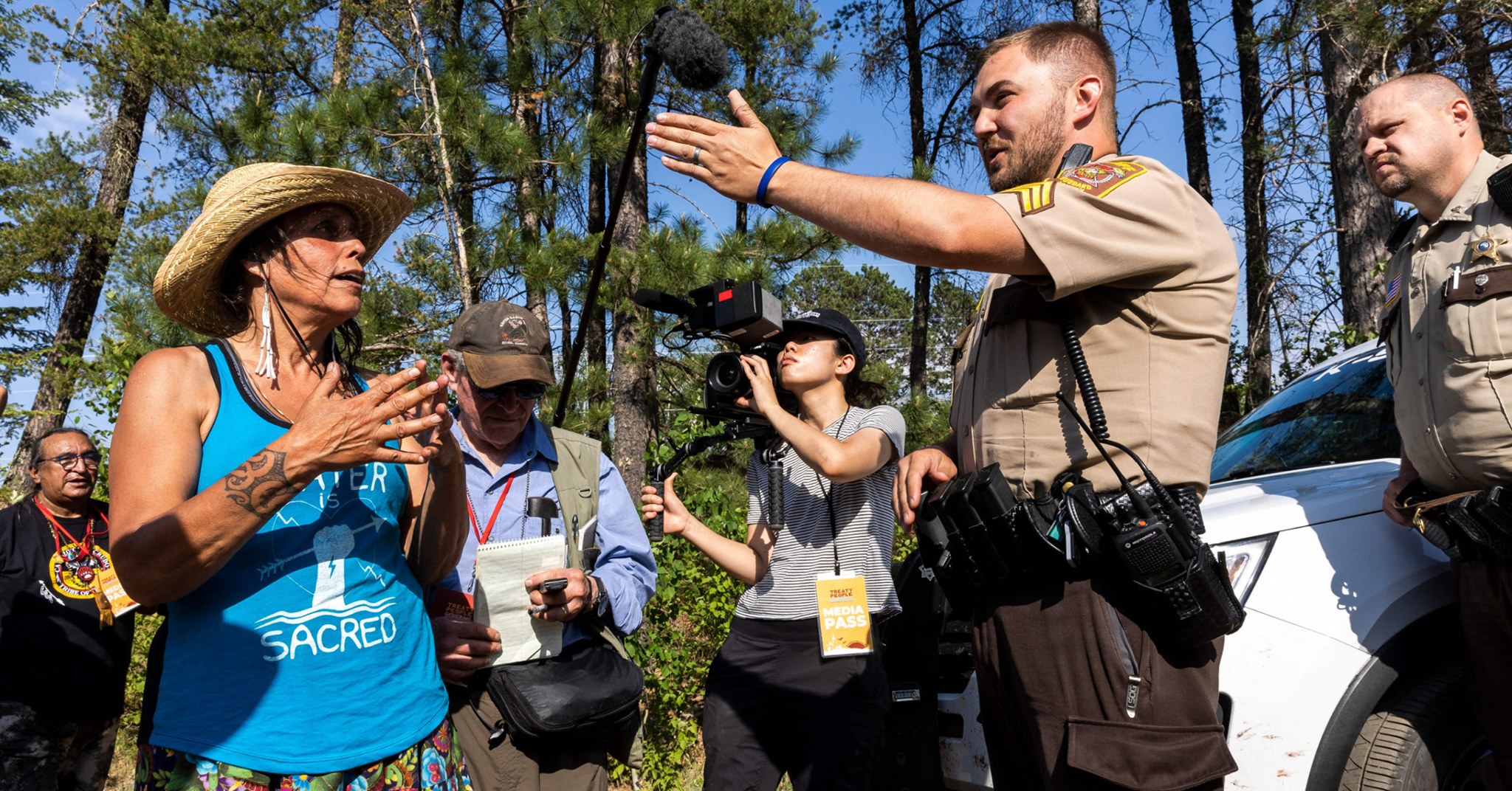
- Details
- By Darren Thompson
WADENA, Minn. — Winona LaDuke, executive director of Honor the Earth and a White Earth Ojibwe tribal member, remains in custody for charges stemming from protesting against Line 3 in northern Minnesota.
On Monday, LaDuke and six other women were arrested for protesting in front of a Line 3 replacement site near the Shell River in Wadena County. After initial appearances on Wednesday, July 21, all posted bail and were released from custody except LaDuke.
Want more Native News? Get the free daily newsletter today.
According to the Aitkin County Jail, LaDuke had a warrant for violating conditions of release. It’s likely she’ll see a judge early Thursday, July 22, to discuss bail and new conditions that may likely be imposed by the court.
On Tuesday, July 20, five people were arrested for breaching a fence surrounding a site occupied by Enbridge. Two were initially apprehended by law enforcement and three others were able to secure themselves to horizontal directional drill equipment, halting drilling under the Shell River. Three were arrested for felony theft, gross misdemeanor trespass, and unlawful assembly.
On Friday, July 16, Native News Online reported that the Wisconsin Department of Natural Resources (DNR) suspended some water appropriation permits in some parts of the state due to an extreme drought. The water appropriation permits haven’t been lifted, but construction continued throughout the weekend with actions to stop construction on Monday and Tuesday.
“Enbridge continues to truck water from other nearby locations, including the Mississippi headwaters,” said the GINIW Collective in a statement on July 20. “Enbridge is drilling under riverbeds across Anishinaabe treaty territory, including the Willow River, where it appears construction hit an aquifer while drilling.”
On July 13, Enbridge issued a statement on its website stating that a small amount of drilling fluid reached the surface during a horizontal directional drill procedure at the Willow River in Aitkin County, Minn. “The drilling fluid is non-toxic and primarily made up of naturally occurring bentonite clay and water and is approved for use by the Minnesota DNR and Pollution Control Agency,” said Enbridge in it response to the drilling cleanup at the Willow River HDD site. “It also includes xanthum gum, which is a common food additive often used in gluten-free baking.”
“There were no impacts to any aquifers nor were there downstream impacts because environmental control measures were installed at this location,” Enbridge said.
The Line 3 replacement project is already over 70 percent complete in Minnesota, according to Enbridge. This includes horizontal directional drilling (HDD) at over a dozen sites. Replacement work is complete in Canada, North Dakota and Wisconsin. The project is on track to be complete and in service by the fourth quarter of 2021.
The proposed new pipeline would transport up to 760,000 barrels of tar sands oil every day across 338 miles in northern Minnesota through 227 lakes and rivers, including the Mississippi River. The pipeline also crosses ceded lands of the Red Lake Band of Chippewa and the White Earth Band of Ojibwe where members of both tribes reserved the rights to hunt, fish, and gather on ceded territory. Many believe that the pipeline would destroy culturally important wild rice beds, risk catastrophic spills, and significantly contribute to climate change, representing the equivalent of 50 coal plants worth of greenhouse gas emissions to the atmosphere.
On July 19, Director of Mainline Construction for Line 3 Barry Simonson said to the Alexandria Echo Press that the project is focused on protecting and conserving water and “continue to work with agencies on next steps.”
“It’s worth noting that our pipelines have coexisted with some of the country’s most productive wild rice waters for seven decades,” said Simonson.
More Stories Like This
Happy Holidays from Native News OnlineAfter Trump cuts, seeds sit in the warehouse
The joyful responsibility of cutting fish
Trump cuts to University of Alaska programs for Native students worse than previously announced
How to build a food sovereignty lab
Help us defend tribal sovereignty.
At Native News Online, our mission is rooted in telling the stories that strengthen sovereignty and uplift Indigenous voices — not just at year’s end, but every single day.
Because of your generosity last year, we were able to keep our reporters on the ground in tribal communities, at national gatherings and in the halls of Congress — covering the issues that matter most to Indian Country: sovereignty, culture, education, health and economic opportunity.
That support sustained us through a tough year in 2025. Now, as we look to the year ahead, we need your help right now to ensure warrior journalism remains strong — reporting that defends tribal sovereignty, amplifies Native truth, and holds power accountable.
 The stakes couldn't be higher. Your support keeps Native voices heard, Native stories told and Native sovereignty defended.
The stakes couldn't be higher. Your support keeps Native voices heard, Native stories told and Native sovereignty defended.
Stand with Warrior Journalism today.
Levi Rickert (Potawatomi), Editor & Publisher
